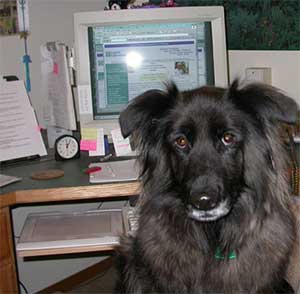
As you’ve probably noticed throughout this series, I’m suggesting that you treat your book like its own little business. Writers write, but authors are published. Getting paid (yes money) is the big difference between people who write for fun and those who become published authors.
When you’re an author, your book is your product. And working on your book is your job. A book doesn’t just write itself. As the author, you can’t just “find” time to write, you have to make time to write. In fact, almost every successful writer has said that writing is his or her job. When these authors sit down at the keyboard to write, they view it as going to work.
Of course, just like life can have an impact on your 9-5 job, it can have an impact on your writing too. Picking up your kids from school, going to the dentist, and taking your dog to the vet are things you schedule around your job. The same thing is true of writing your book. Yes, you have a lot of things competing for your time. You just need to include writing in the mix.
When you’re thinking about how you can schedule in your writing time, consider these issues:
The time of day you write best. If you are a morning person, make sure you schedule writing time then. In contrast, if the only time the house is quiet is after the kids are in bed, turn off the TV and head for your computer.
How you react to deadlines. You may have heard the saying that “nothing happens without a deadline.” For many people, it’s utterly true. If you need a deadline to get your writing done, find one. For example, I’m speaking at BlogPaws and my goal is to have my next book finished in time for the conference.
If you need accountability, set up a book writing mastermind group with some writing buddies, or join an existing group. Once you have figured out when you can write and you’ve adjusted your schedule, you have to actually write during your allotted writing time. (Yes, I know how it is; sometimes you’d rather hang out and look at your ex-boyfriend’s mother-in-law’s vacation pictures on Facebook than work on your book.) To get a book done, sometimes you have to write when you really don’t feel like it.
Many people suggest keeping a journal or free writing to get going. Neither of those ideas worked for me because I always want to create something I can use later. But I have found that when I don’t want to write, the fastest way to jump-start my brain is to just start typing ideas. If you don’t touch type, then writing on paper, using a mini-tape recorder or a speech recognition program are a few other ways you can get your ideas in gear and move forward.
Next time in step 7, I’ll talk about how to decide on the best book publishing path for you.
Did you miss a step? Here are links to the Blog Your Book series:
Overview – Blog Your Book: It’s Not As Hard As You Think.
Steps:
- Ask your community about their biggest problems.
- Brainstorm ideas and use a mind map or outline to organize them.
- Research the competition.
- Refine your topic and search for content you can “recycle.”
- Define your book’s unique selling proposition.
- Set aside writing time and establish deadlines.
- Learn about the book business and decide on a publishing path.